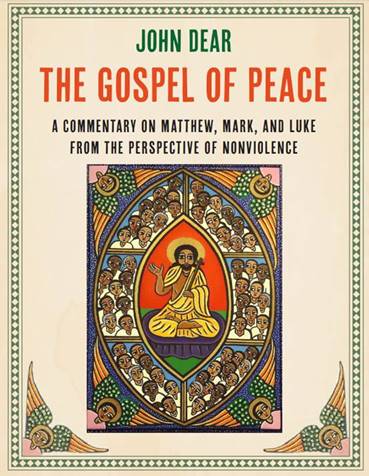Welcome to the Beatitudes Center for the Nonviolent Jesus!
January 12th, 2026
Episode #54, John Dear in conversation with Charlene Howard, Director of Pax Christi USA
 On this week’s episode of “The Nonviolent Jesus Podcast,” John Dear speaks with Charlene Howard, the executive director of Pax Christi USA, the national Catholic peace movement, about Pax Christi’s ongoing work for justice, disarmament and peace.
On this week’s episode of “The Nonviolent Jesus Podcast,” John Dear speaks with Charlene Howard, the executive director of Pax Christi USA, the national Catholic peace movement, about Pax Christi’s ongoing work for justice, disarmament and peace.Next week…
The Nonviolent Jesus Podcast welcomes Rev. Andrew Young! For more information, visit here.
January 19th, 2026
Episode #55, John Dear in conversation with Rev. Andrew Young
 On this week’s episode of “The Nonviolent Jesus Podcast,” John Dear speaks with Civil Rights legend, Rev. Andrew Young to mark the Dr. King national holiday.
On this week’s episode of “The Nonviolent Jesus Podcast,” John Dear speaks with Civil Rights legend, Rev. Andrew Young to mark the Dr. King national holiday.
Next week…
The Nonviolent Jesus Podcast welcomes Mike Farrell of MASH! For more information, visit here.
Upcoming Zoom Programs:

John Dear’s new book now available
“The Gospel of Peace:
Reading Matthew, Mark & Luke
from the Perspective of Nonviolence”
To invite John Dear to speak in your city, write to: john@beatitudescenter.org

John Dear’s new book available February 17th, 2026
Universal Love:
Surrendering to the God of Peace
By John Dear
Sign up to receive the Beatitudes Center Newsletter
We promise we will NOT share or sell your information to any 3rd party advertisers.
LATEST NEWS FROM THE BEATITUDES CENTER

Quote for the Day:
“The wolf shall live with the lamb; the leopard shall lie down with the kid. The calf and the lion will feed together, and a little child shall lead them. The cow and the bear shall graze; their young shall lie down together;
and the lion shall eat straw like the ox. The nursing child shall play over the hole of the asp, and the weaned child shall put its hand on the
adder’s den. They will not hurt or destroy on all my holy mountain,
for the earth will be full of the knowledge of the God of peace as the waters cover the sea.”
(Isaiah 11:6–9)
Quote for the Day:
“I am called in the Word of God — as is everyone else — to the vocation of being human, nothing more and nothing less … To be a Christian
means to be called to be an exemplary human being. And to be a Christian categorically does not mean being religious. Indeed, all religious versions of the gospel are profanities. In the face of death, live humanly. In the middle of chaos, celebrate the Word. Amidst Babel, speak the truth. Confront the noise and verbiage and falsehood of death with the truth and potency and efficacy of the Word of God. Know the Word, teach the Word, nurture the Word, preach the Word, define the Word, incarnate the Word, do the Word, live the Word. And more than that, in the Word of God, expose death and all death’s works and wiles, rebuke lies,
cast out demons, exorcise, cleanse the possessed,
raise those who are dead in mind and conscience.”
–William Stringfellow
January 12, 2026
Dear friends, Christ’s blessings of peace!

This week, millions of us mourn Renee Nicole Good who was shot to death by ICE on the streets of Minneapolis, while legally monitoring ICE immigration arrests. We mourn the over thirty who died in ICE’s custody over the last year. We’re also mourning the 100 people killed by the U.S. in last week’s bombing of Venezuela, where we kidnapped the president. We mourn all those we killed in the nine places the U.S. bombed over the last twelve months: Syria; Iran; Iraq; Yemen; Nigeria; Somalia, Venezuela, and I include–because we fund warmaking–Palestine/Gaza and Sudan. Not to mention, the 231 million killed by warfare and conflict in the last century (according to the Center for International and Security Studies at the Univ. of Md.)
Besides the ongoing loss of loved ones, friends, and those who died during the pandemic, we also mourn the countless millions who die from poverty and poverty-related disease, as well as gun violence, the death penalty, and many other forms of violence. And we mourn the billions of creatures who have died because of our use of fossil fuels.













 Paula D’Arcy, “Blessed are those who mourn”
Paula D’Arcy, “Blessed are those who mourn” Rev. Charlie McCarthy, “The Nonviolent Jesus Is, Before Abraham or the World Was”
Rev. Charlie McCarthy, “The Nonviolent Jesus Is, Before Abraham or the World Was” Ched Myers on his new book, “Healing Affluenza and Resisting Plutocracy: Luke’s Jesus and Sabbath Economics”
Ched Myers on his new book, “Healing Affluenza and Resisting Plutocracy: Luke’s Jesus and Sabbath Economics” Sr. Helen Prejean, in conversation with John Dear, on the Holy Week Journey of the Nonviolent Jesus
Sr. Helen Prejean, in conversation with John Dear, on the Holy Week Journey of the Nonviolent Jesus